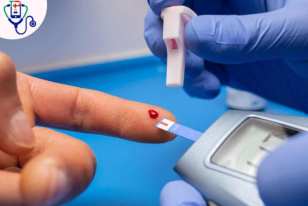Diabetes in Kashmir: Rising Incidence and Effective Prevention
- 10 Jun 2024
- 0 Comments
- Public Awareness
By: Dr. Ishtiaq Jeelani
Diabetes is a chronic disease that affects the way the body processes blood sugar (glucose). It is characterized by high levels of glucose in the blood, which can lead to a number of serious health complications if left unchecked. Diabetes has become a major public health concern in Kashmir, with rates of the disease continuing to rise in recent years. According to a study conducted by the Government Medical College in Srinagar, the prevalence of diabetes in Kashmir has increased by approximately 60% over the past decade. This rise in diabetes is a cause for concern, as it can lead to a number of serious health complications such as heart disease, stroke, kidney disease, and blindness. There are a number of potential reasons for the increase in diabetes in Kashmir. One possible reason is the changing lifestyle and diet of the population in Kashmir. In recent years, there has been a shift towards a more sedentary lifestyle, with more and more people spending long hours sitting in front of computers or televisions. This lack of physical activity can lead to weight gain and obesity, which are major risk factors for diabetes. Another potential reason for the increase in diabetes in Kashmir is the availability of high calorie, processed foods. These types of foods, which are often high in sugar and unhealthy fats, have become more readily available in Kashmir in recent years. As a result, more people are consuming these types of foods, which can contribute to the development of diabetes. In addition to lifestyle and diet, genetics may also play a role in the development of diabetes. Some people may be more genetically predisposed to developing the disease, which can increase their risk of developing diabetes even if they lead a healthy lifestyle and eat a healthy diet.
In Kashmiri population, the age-wise distribution of diabetes is 2.95% (< 30 years), 13.3% (30-39 years), 32.75% (40-49 years), 36.25% (50-59 years), 19.75% (60-69 years) and 2.7% (> 70 years). In the Kashmiri population, 84% of the diabetic patients are in the middle-income group, 14% in the high-income group and 2% in the low-income group. In the Kashmiri total diabetic population, 11.5% of the diabetic patients are smokers.
There are some specific dietary recommendations that may be helpful for people with diabetes in Kashmir. These include:
- Choose whole grains: Instead of white rice or refined flour, opt for whole grains such as brown rice or whole wheat flour. These provide more fiber and nutrients, which can help to regulate blood sugar levels.
- Limit added sugars: Many Kashmiri dishes are sweetened with sugar or other sweeteners, which can be a concern for people with diabetes. If you are preparing Kashmiri dishes at home, you can try using alternative sweeteners such as honey or date syrup, or you can use less sugar in your recipes.
- Include plenty of vegetables: Kashmiri cuisine often features a variety of vegetables, which are a good source of nutrients and fiber. Be sure to include plenty of vegetables in your meals to help balance out the other ingredients.
- Limit high-fat meats: Some Kashmiri dishes include high-fat meats such as lamb, beef, or goat, which can contribute to heart disease and other complications associated with diabetes. If you are including meat in your meals, choose leaner cuts and try to limit your overall intake.
- People in Kashmir are habitual of eating late dinner and eating lot of rice and meat products and go to bed soon after dinner. Eating late at night may lead to acid reflux and negatively affect blood sugar management, blood pressure, and weight. It can also slow your metabolism or alter your body's ability to turn food into energy and use up fatty acids.
- Keep in mind that the longer time you give your body between your dinner meal and your bedtime is better.
- Kashmiris have a routine of drinking tea multiple times daily; it is suggested to reduce the sugar content and add ginger and cinnamon. Cutting added sugars makes it easier to manage weight and to keep blood glucose levels within healthy parameter.
- Ask your doctor to check you for diabetes and prediabetes. Your health may be silently threatened by prediabetes. The sooner you control your blood sugar, the less harm your body will sustain.
- Daily physical activity is encouraged. 5 times a week, go for a 30-minute nice walk.
- Another issue to be concerned about when talking about diabetes is smoking, which is a serious problem among Kashmiris and is getting worse day by day. You may already be aware that smoking increases a person's risk for developing cancer, as well as heart, lung, and other organ diseases. However, you might be unaware that smoking raises your risk of developing type 2 diabetes.
It is crucial to understand that no single diet works for everyone with diabetes. Collaborating with a healthcare professional to create a personalized eating plan is always a wise choice. At TELEPRAC and DAR Medicare, our health resource center is dedicated to assisting individuals in developing individualized plans alongside our medical professionals. The increasing rate of diabetes in Kashmir is indeed alarming. It is vital for people to recognize their diabetes risk and take proactive measures to prevent the disease. This includes maintaining a healthy weight, engaging in regular exercise, and following a nutritious diet. Government and health organizations can contribute significantly by implementing public health campaigns and policies that promote healthy lifestyles and ensure healthcare accessibility for those affected by diabetes.
If you wish to have a diet plan tailored specifically for you, we encourage you to speak with our dietitian. You can find a suitable dietitian here. For those who prefer to consult a diabetes expert or endocrinologist, please click here to book your appointment now. Thank you






Comments (0)